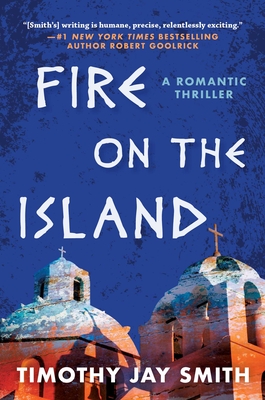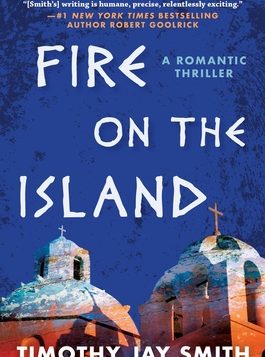 FIRE ON THE ISLAND
FIRE ON THE ISLAND
by Timothy Jay Smith
Arcade CrimeWise Publishing. 267 pages, $24.99
IN THE FICTIONAL TOWN of Vourvoulos, FBI agent Nick Damigos has been summoned to this Greek island paradise by the village mayor. Nick goes undercover there to investigate a series of suspicious fires believed to be the work of an arsonist, which threaten the small seaside town. So begins Fire on the Island, the latest novel by Timothy Jay Smith.
Nick, who is gay and posing as a writer, arrives in the small village just as the eleventh in a series of fires has broken out, and he heroically saves an endangered dog. In this way he immediately endears himself to the community. The mysterious fires have imperiled the town, and Nick is determined to put a stop to them. He discovers early on that there seems to be a pattern to the location of each fire—from the town’s periphery toward the center of the village. A historic church in the middle of town and a large fuel basin seem to be the next likely targets. If the fires reach the basin, the entire village could be destroyed.
Smith adeptly weaves into the story the history of the village’s communist past and from earlier days when its inhabitants were mainly Turks. He shows how the village is now dealing with the poor Greek economy, struggling with the restrictions imposed on it by the European Union. He deftly integrates the conflicting responses to the Syrian refugees fleeing to their shores from Turkey.
Throughout the novel, Smith reveals the resentment that the villagers feel toward displaced persons. At the heart of that enmity is the villagers’ belief that their social welfare system is unduly strained by the recent arrivals. Tourism, the economic lifeblood of the region, has fallen off, and the native-born view is that the proximate cause of that decline is the alien influx. To Smith’s credit, he also examines the trials and tribulations of refugees with a compassionate heart. And he’s a good storyteller, creating suspense over the mystery of the arsonist. Takis has a personal history with fire because his parents died in a suspicious one years before. Father Alexis served as the vicar of a church that mysteriously burned down. Even Nick had a horrendous experience with fire, which left horrific scars on his back.
Two love stories, one gay and one straight—that of Nick and Takis and that of Athina and Ridi—dominate the emotional action in this story. Each relationship evokes the passion of a new romance, but that of Athina and Ridi, it must be said, devolves into an unintended banality that detracts from those sympathies. On the other hand, Smith has taken pains to compare and contrast the emotional qualities of gay and straight relationships in a way that adds a heightened level of insight.
Fire on the Island has one instance of sexual assault along with several depictions of ethnic racism and homophobia. These elements do not seem misplaced in any way but carry the story toward a satisfying conclusion. Smith has blended action, drama, romance, and mystery into an arresting tale set in an alluring part of the world. ___________________________________________________________
William Burton is a writer based in Provincetown, Mass.





